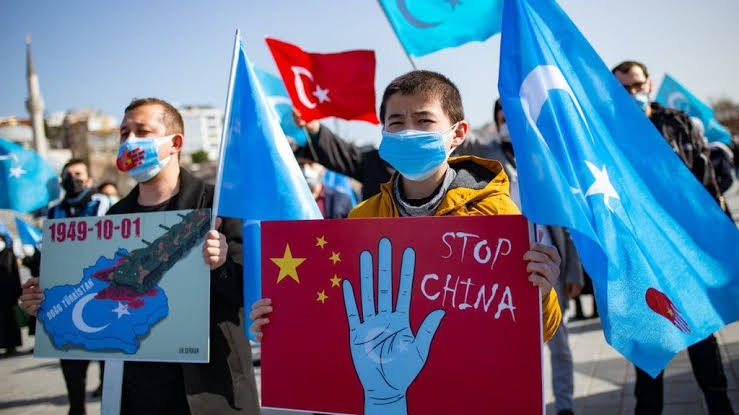Chinese Atrocities On Muslims In Xinjiang

Chinese Foreign Minister Wang Yi’s was invited by Pakistan for the OIC conference in Islamabad recently. Wang gave assurance, to the OIC Conference that China would look after the interests of Muslim nations. What a joke, this is in total contradiction to events in his own backyard.
There are widespread atrocities committed against Muslims of the Uyghurs community in Xinjiang. Pakistan too has developed amnesia on this issue and ignores the genocide among Uyghurs.
Since 2017, the Chinese government has detained about 1.8 million Uyghurs and other Turkic minorities in hundreds of “re-education camps” in Xinjiang.
An effort to prevent possible religious extremism and terrorism had led to “terror capitalism” – a system that justifies oppression by branding Uyghurs a security threat to generate state investment in policing and surveillance technologies to monitor and control them.
The rise of an economic form of a kind of security-industrial complex where the state has hired over 1,000 contractors – private companies – to build forms of surveillance that will sort through Uyghur and Kazakh behaviour and diagnose who is potentially a criminal.
They are using Chinese counterterrorism laws, which are very broad and define things as terrorism like having WhatsApp on your phone, using a VPN, and having relatives who live abroad and sending them money.
Witness testimonies and investigative reports have since alleged that the Chinese government has tortured detainees, sterilized Uyghur women, and conscripted Uyghurs for work in factories.
China also continues to carry out discriminatory work policies, such as forced labour, impossible production expectations, and long working hours, against the Uyghurs in Xinjiang, a United Nations committee stated on February 11.
The report from the International Labour Organization stressed that China has violated various articles of the Employment Policy Convention of 1964, which Beijing ratified in 1997, including the right to freely choose employment.
The 870-page report, titled Application of International Labour Standards, was an assessment by the Committee of Experts on the Application of Conventions and Recommendations.
The report stated that China continues to engage in widespread and systematic “programs” involving the extensive use of forced labour of the Uyghur and other Turkic and Muslim minorities in Xinjiang.
Some 13 million members of the ethnic and religious minorities in Xinjiang are targeted based on their ethnicity and religion, adding that Beijing justified its methods in a context of “poverty alleviation”, “vocational training”, “re-education through labor” and “de-extremification”.
A key feature of China’s program is the use of forced labour in or around internment or “re-education” camps housing some 1.8 million Uyghur and other Turkic or Muslim peoples in the region.
The abuses take place in or around prisons and workplaces across Xinjiang and other parts of the country.
From an international perspective, the US Senate unanimously voted in December last year to ban virtually all imports from China’s north-western Xinjiang region over concerns about the prevalence of forced labour.
The US government stated that more than one million Uyghurs and other Turkic-speaking Muslims are incarcerated in camps to root out their Islamic cultural traditions and forcibly assimilate them into China’s Han majority.
The United States has described the campaign as genocide. Along with Australia, Britain, and Canada, it had announced a diplomatic boycott of the Beijing Winter Games over the issue.
The Biden administration also sanctioned Chinese firm SZ DJI Technology, the world’s largest producer of consumer drones used in filmmaking and aerial photography, over surveillance in Xinjiang, where China has been honing new technologies in artificial intelligence and DNA tracking to keep a track of Uyghurs.
Other companies targeted included Ziamen Meiya Pico Information, which has developed a mobile application to track files on individuals’ phones, and Cloud walk Technology, which was developed to recognize the faces of Uyghurs and Tibetans.




